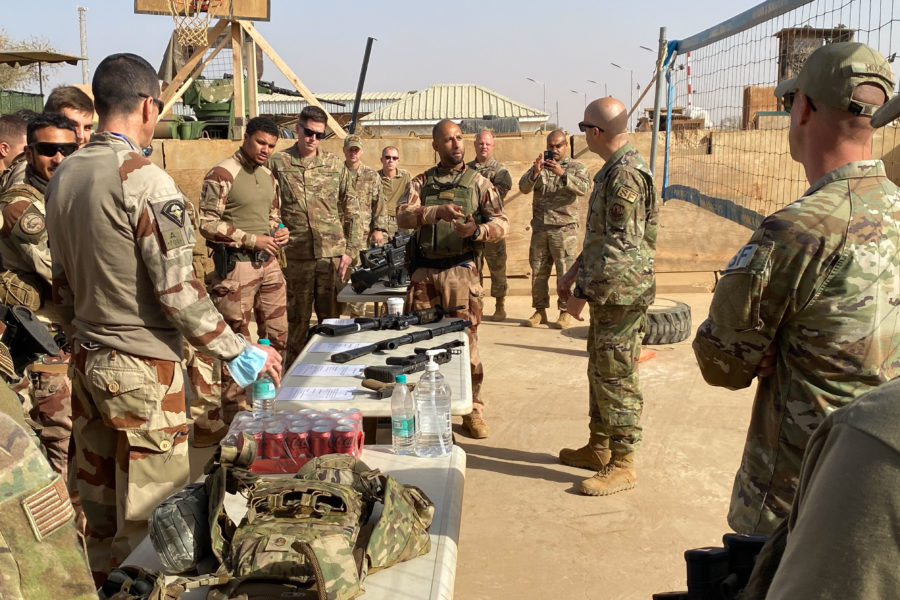AIR BASE 101, NIAMEY, Niger—Domed tents pumped full of cool air are lined in neat rows that resemble a neighborhood at Air Base 101 in the sub-Saharan country of Niger, a base for MQ-9 operations against a panoply of terrorist groups operating in the region.
Between the tents, quick-footed Airmen grab water bottles from shaded pallets as they crunch over gravel. Heavy, armored vehicles meant to protect convoys from attack by militants enter and exit the compound through cement barricades, passing security checkpoints lined with concertina wire.
Airmen cannot even see the flight light from here. To execute the mission, Airmen at the small operating location rely on a deep sense of purpose and a family atmosphere. Growth opportunities for young Airmen also help them overcome the challenging work environment and off-base restrictions.
“I’d say morale out here is high,” the forward aviation detachment commander in Niamey told Air Force Magazine on a recent visit.
“It’s always nice to kind of see that what you’ve done, results and a physical thing happening,” explained the special operator, who spoke on the condition that his name not be used. “Planes taking off and landing, coming back with post-mission intel. Yeah, that’s always good, it’s rewarding.”
The 33-year-old commander said the leadership opportunities for young Airmen at the African base have challenged him to manage both assets and people.
“It’s really working with people that makes this rewarding,” he said of a bare base where parts may take weeks to arrive, and mail takes even longer.
“Managing physical assets is a lot easier than emotional human beings,” he said. “Just dealing with people is a challenge on those hard days when something goes wrong, but on the good days, it’s also very rewarding to see that you help somebody grow.”
The distance from home and other bases, and the security and work challenges, make Airmen rely on each other. It requires young leaders with emotional intelligence to listen, coach, and help younger Airmen grow.
“As much as there’s challenges and difficulty here, it opens up your opportunity to engage your personnel more, and work through whatever issues,” security forces flight commander Capt. Andrew Cook told Air Force Magazine, seated in a black leather lazy-boy chair jammed in the recline position in the narrow corridor of a makeshift library tent. Outside, lizards darted underneath picnic tables where off-duty Airmen told stories and shared laughs.
“Even with the challenges that are present sometimes, … it forces people to lean on each other and say, ‘Hey, like, can you help me out with this?’” he said.

Chief Master Sergeant of the Air Force Joanne S. Bass visited Air Base 101 and Air Base 201 in Agadez, in central Niger, in December, braving sandstorms and oppressive heat to hear what Airmen needed.
“It was actually really windy,” she said in a phone interview with Air Force Magazine. “I didn’t anticipate the sandstorms that we used to get out in like Afghanistan or Iraq.”
The wind and sandstorms delay, shorten, and sometimes cancel MQ-9 sorties. They also increase the frequency of aircraft maintenance and repair.
“A more remote location … comes with its own set of challenges, and some of those challenges we’ve identified and we’re working,” Bass said of the supply-chain complaints that she heard.
“If I had to characterize the morale that I experienced during my visit, it very much was more tight-knit, family-oriented, where everybody knew each other. And that makes for good morale,” she added. “Most of them were all excited that they’re able to get out there and have a sense of purpose to a broader mission within their own organization.”
With just 800 Airmen combined on six-month rotations on the two bases, duties demand creativity and skills that go beyond the job description.
“This is definitely the most involved mission that I’ve been in,” said a navigator who serves as detachment commander at AB201, speaking on condition of anonymity.
“My pilots that come through training, we can have a second lieutenant that is the aircraft commander, which you don’t get anywhere else,” he said. “They will be at the controls of an MQ-9.”
While coming in with little real-world experience to a position of high responsibility provides its own set of challenges, successful pilots will control an asset on the leading edge of technology and innovation.
“You’re remotely piloting this aircraft that is in very high demand,” he said.
“Every combatant commander is just wanting more and more support from MQ-9,” he said. “It’s a great, great opportunity to get some experience, get your foot in the door, and gain skills and qualities and knowledge that will benefit you for the rest of your life.”





